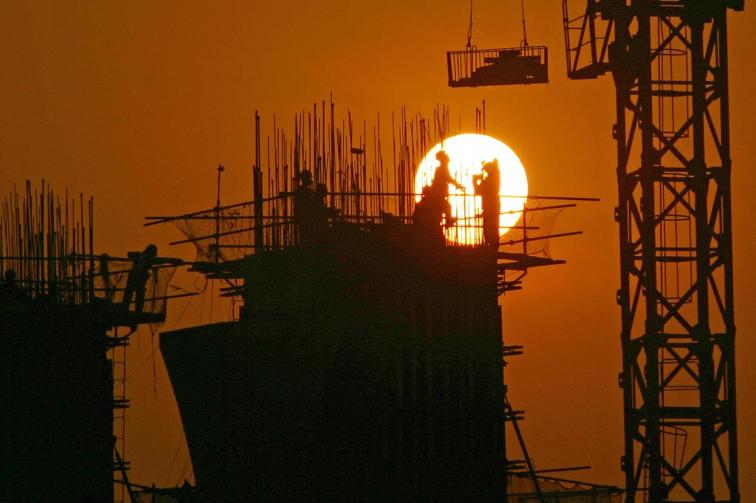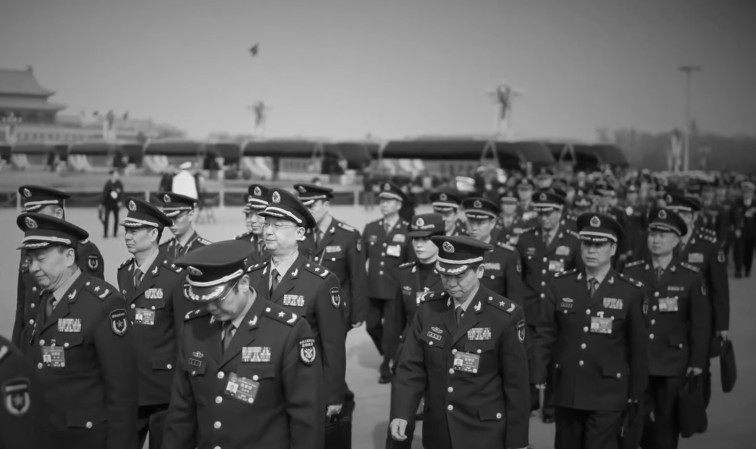China's Economy on a Roller Coaster, Shaking and Sliding Downward (Graphic by People News)
[People News] Data released by the National Bureau of Statistics of China on Wednesday (September 10) revealed that in August, the Consumer Price Index (CPI) for Chinese residents fell by 0.4% year-on-year, marking the largest decline in six months and surpassing expectations. Economic analysts suggest that China is ensnared in a negative cycle of deflation, with no immediate prospects for change. It may take a decade of lost economic growth before a recovery is possible. Furthermore, the Xi Jinping administration has had numerous opportunities to revitalise the Chinese economy over the past decade, yet each time it opted to reinforce state control instead of implementing the reforms that many Chinese economists consider essential.
Experts: China is caught in a deflationary vortex, making escape difficult
The Epoch Times reports that data from the National Bureau of Statistics of China on Wednesday (September 10) also showed a significant decline in food prices, which dropped by 4.3% year-on-year in August, a larger decrease than the 1.6% drop recorded the previous month, contributing to a decline in overall prices. The core CPI (excluding food and energy) rose by 0.9% year-on-year, up from 0.8% in July, reaching a two-and-a-half-year high.
The Consumer Price Index is a crucial indicator for assessing inflation or deflation. According to data released on the National Bureau of Statistics of China's website, the country is currently enveloped in the shadow of deflation.
Wang Guochen, an assistant researcher at the Mainland Economic Research Institute of the Chung-Hua Institution for Economic Research, stated in an interview with the Epoch Times that China's deflation is, in fact, predictable, primarily due to a shift from virtual to real, which has resulted in a decrease in job vacancies in the service sector, making employment more challenging. Most individuals, particularly young people, are unemployed and consequently lack purchasing power.
The second reason is to maintain a certain level of employment, which is why zombie enterprises (failed businesses) continue to operate. The ongoing operations of these zombie enterprises generate a certain amount of production capacity. When this production capacity is combined with weak consumer demand, prices continue to decline.
In response to the bleak economic data released by the Chinese Communist Party, Premier Li Qiang proposed in this year's Government Work Report that there should be a comprehensive overhaul of 'involution' competition.
Wang Guochen believes that Li Qiang's measures against overcapacity will lack significant impact, as targeting these overcapacity industries will first lead to an increase in unemployment, and secondly, the relief loans provided by banks will turn into non-performing loans. Thus, it is impossible to completely eliminate these zombie enterprises, and the deflationary situation will inevitably persist.
According to a report by Deutsche Welle, major Western economies have been grappling with inflation issues in recent years. In contrast, Beijing has been forced to confront the domestic consumption weakness stemming from the prolonged downturn in the real estate market and the escalating challenges facing exports, resulting in stagnant or declining prices. This deflationary trend has dampened investor confidence and poses a threat to Beijing's official growth target of approximately 5% for this year.
Professor Fan Jiazong from the Department of Economics at National Taiwan University told The Epoch Times that China's deflation has lasted for over 20 months, and economists initially anticipated that it would not be a short-term fluctuation. 'Deflation typically persists for an extended period. It indicates that your economy has entered a negative cycle; like a vortex, once you get caught in the deflationary cycle, it is very difficult to break free.'
Analysis: China's Economy May Need a Lost Decade to Recover
In the early 1990s, Japan's economic bubble burst, resulting in a stock market crash, declining housing prices, and deflation, which led to a lengthy economic adjustment period that lasted for 30 years.
Fan Jiazong pointed out that, taking Japan's 'lost three decades' as a reference, Japan underwent a 30-year economic adjustment period, with noticeable changes only emerging in the past year. In recent years, foreign capital has been withdrawing from China, returning to various countries, including Taiwan and Japan. After Japanese companies repatriated, they gradually began to address Japan's deflationary issues.
Furthermore, Rory Green, Chief China Economist at GlobalData Lombard, analysed that China is bound to experience a lost decade of economic growth. This situation mirrors Japan's economic stagnation following the collapse of its asset and credit bubble in the 1990s. The current economic downturn in China is partly due to human factors, as authorities are trying to manage the excessive expansion in the real estate sector and local government debt.
Alicia Garcia Herrero, Chief Economist for Asia-Pacific at Natixis, mentioned during a webinar in July that Natixis's research on 2,500 listed Chinese companies reveals a scenario where transaction volumes are increasing, yet their value is being adversely affected by deflationary pressures. While these companies may appear to dominate the market, they are actually paying a steep price, as they struggle to generate the revenue necessary for continued operations.
During a recent webinar, Xu Jianwei, Senior Economist at Natixis Greater China, warned that the situation in the second half of this year could be even more challenging. He stated, 'We see that, particularly the profits of manufacturing companies are still declining.' He added, 'In the second half of the year, more households may face pressure, as finding jobs will become increasingly difficult.'
According to a recent report by the Wall Street Journal, over the past decade, Xi Jinping has had several opportunities to mend the Chinese economy, but he has consistently opted to reinforce state control instead of implementing the reforms that many Chinese economists deem necessary. While some of China's economic issues had surfaced before Xi Jinping took office, he has not managed to resolve them.
The Wall Street Journal reported that a consulting firm prepared a report for senior leaders of the Communist Party of China, indicating that without more urgent measures to stimulate economic growth, China could descend into a deflationary spiral, akin to the challenges faced by the United States during the Great Depression. However, 'Xi Jinping remains unfazed by this.' Sources close to the upper echelons of the Communist Party's decision-making circles disclosed that Xi Jinping once asked his advisors, 'What’s wrong with deflation? Don’t people prefer lower prices?'
It is widely recognised that deflation can lead to a vicious cycle of falling prices and weak demand, yet insiders report that Xi Jinping's dismissive attitude has rendered deflation almost a taboo subject within the top decision-making circles of the Communist Party.
Fan Jiazong remarked that such statements reflect a complete lack of economic understanding, akin to the opinions of vendors in a market, which diverge significantly from the views of economic professionals. 'Deflation is actually a very dangerous macroeconomic crisis, and from various perspectives, it can be even more perilous than inflation.'
He further elaborated that the inflation experienced in the United States in 2021 was swiftly addressed within one or two years through tightening monetary policy; inflation tends to rise and fall rapidly. In contrast, regarding deflation, one must ask how long it took Japan to resolve its issues. The challenges currently faced by the Chinese Communist Party are quite complex and difficult to manage.
As for how long mainland China is expected to endure deflation before the economy can stabilise, Fan Jiazong believes that there are no immediate signs of change, and it is generally anticipated that this deflationary trend will persist for at least 5 years, and possibly as long as 10 years, before any potential turnaround occurs. △











News magazine bootstrap themes!
I like this themes, fast loading and look profesional
Thank you Carlos!
You're welcome!
Please support me with give positive rating!
Yes Sure!